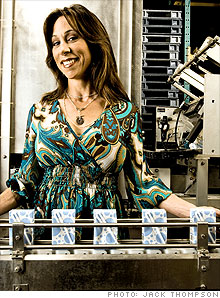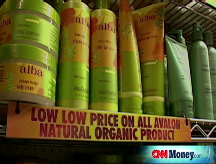The hidden flaws of 'green' products
Trying to sell eco-friendly boxed water, entrepreneur Stacey Griffin discovered potholes on the road to going green.
 |
| Aqua2Go CEO Stacey Griffin in her New Orleans boxed-water factory |
(Fortune Small Business) -- When Stacey Griffin launched Aqua2Go, which sells boxed water for kids, she did so with the best intentions. A skillful entrepreneur, Griffin expects her New Orleans company to reach $500,000 in annual sales in 2008, in part by stressing her product's "environmental benefits" on her packaging.
Bottled water has become an anathema in green circles because of its effect on global warming. Carbon dioxide is emitted in manufacturing the plastic containers and in the shipping of the water from sources that might be an ocean away. Instead, Griffin, 40, would offer water in recyclable cardboard boxes made of paper derived from forests that are harvested sustainably.
Yet labeling a product green is often fraught with difficulties. Tracing materials to their source and verifying their environmental credentials can be a Herculean task. Had Griffin done more homework - she admits devoting only a few hours to research - she would have learned that her product isn't as green as her marketing suggests. For starters, Griffin's water boxes, manufactured by Swiss giant Tetra Pak, are composed of 20% polyethylene. That means Aqua2Go imposes the same environmental costs (depletion of scarce oil, greenhouse gas emissions) as 100% plastic bottles, only in reduced proportion.
The cardboard in the package has led Griffin into more controversy than she bargained for. To make its boxes, Tetra Pak draws on lumber that is harvested in accordance with the Sustainable Forestry Initiative (SFI). But environmental groups such as the National Wildlife Federation and the Sierra Club have blasted the SFI as a timber industry front, allowing clear-cutting and other damaging practices under the guise of ecological concern. SFI critics have even set up a website: dontbuysfi.com. Responds Kathy Abusow, CEO of SFI: "I find it disappointing that these groups focus on us when 90% of the world's forestry activity is done without any kind of certification."
Nor can Aqua2Go claim a recycling advantage. Only about 25% of plastic water bottles get recycled. But for water boxes, the proportion is likely even lower. Only one in five Americans lives in a community that offers a curbside recycling program for this kind of packaging.
"Yes, I think that's true," says Ed Klein, vice president of environmental affairs for Tetra Pak. "But we want to see more recycling of our packages."
Still, Griffin plans to stick with her green message: "I guess the only genuine solution is reusable containers, but I do think there are environmental benefits to my packaging." As with any green product, the consumer will ultimately decide. ![]()
Pitching Mother Nature
Investing in a green work environment
Hot thin roofs
-
The Cheesecake Factory created smaller portions to survive the downturn. Play
-
A breeder of award-winning marijuana seeds is following the money and heading to the U.S. More
-
Most small businesses die within five years, but Amish businesses have a survival rate north of 90%. More
-
The 10 most popular franchise brands over the past decade -- and their failure rates. More
-
These firms are the last left in America making iconic products now in their twilight. More









